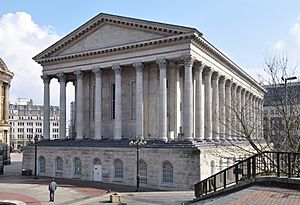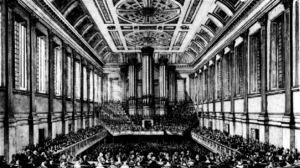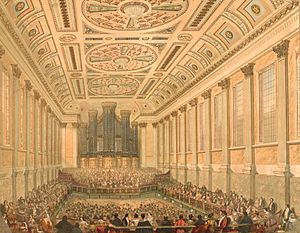Birmingham Triennial Music Festival facts for kids
The Birmingham Triennial Music Festival was a big event for classical music in Birmingham, England. It happened every three years, which is what 'triennial' means! The festival started way back in 1784 and ran until 1912.

Contents
Festival History and Purpose
The very first music festival in Birmingham took place in September 1768. It lasted for three days. The main goal was to collect money for a new hospital. This hospital was called the General Hospital on Summer Lane.
Another festival was held in 1778 to gather even more funds. The hospital finally opened its doors in September 1779.
Becoming a Triennial Event
From September 1784, the festival started happening every three years. This is why it was called "Triennial." It always aimed to raise money for the hospital. This charitable purpose was a key part of the festival.
A New Home for Music
At first, the festival was held in churches and theatres. But these places soon became too small for such a popular event. So, in 1834, the amazing Birmingham Town Hall was built. This new building had much more space. It became the main home for the festival.
Famous Musicians and New Works
Many very famous musicians came to perform at the festival. They included some of the greatest composers and conductors of their time.
Felix Mendelssohn's Contributions
One of the most famous musicians was Felix Mendelssohn. In 1837, he conducted his oratorio St. Paul. An oratorio is a large musical work for voices and orchestra, usually telling a story. Mendelssohn also played the organ at the festival. He even played the piano in the very first performance of his Piano Concerto No. 2. The festival had asked him to write this piece especially for them.
At the next festival, Mendelssohn played his Piano Concerto No. 1. In 1846, just a year before he died, the festival asked him to write another oratorio. This one was called Elijah. It was a huge success! Mendelssohn was paid 200 guineas for it. After that, Elijah was performed at every festival.
Other Commissioned Composers
The festival often asked other composers to write new music. This helped to create many important works. Some of these composers included Arthur Sullivan, Max Bruch, Charles Gounod, and Antonín Dvořák.
Great Conductors
In 1885, the famous conductor Hans Richter became the main conductor for the festival. He was known for leading orchestras with great skill.
Edward Elgar's Premieres
Edward Elgar was another very important composer for the festival. He wrote several pieces especially for it. In 1900, his oratorio The Dream of Gerontius was performed for the first time. In 1903, he presented The Apostles. Then, in 1906, came The Kingdom. His last work for the festival was The Music Makers in 1912. The main conductor in 1912 was Henry Wood.
The End of the Festival
The festivals in 1909 and 1912 did not make much money. They could not give any funds to the hospital. Soon after, World War I began. Because of these problems, the festival stopped. It never started again after the war ended.
Images for kids
 | Precious Adams |
 | Lauren Anderson |
 | Janet Collins |




